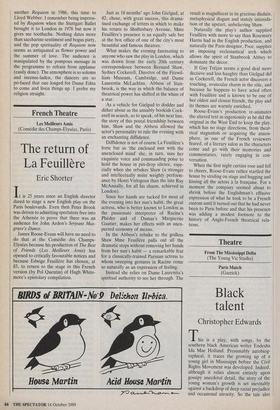French Theatre
Les Meilleurs Amis (Comedie des Champs-Elysées, Paris)
The return of La Feuillere
Eric Shorter
It is 25 years since an English director dared to stage a new English play on the Paris boulevards. Even then Peter Brook was driven to admitting spectators free into the Athenee to prove that there was an audience for John Arden's Serjeant Mus- grave's Dance.
James Roose-Evans will have no need to do that at the Comedie des Champs- Elysées because his production of The Best of Friends (Les Meilleurs Amis) has opened to critically favourable notices and because Edwige Feuillere has chosen, at 83, to return to the stage in this French version (by Pol Quentin) of Hugh White- more's epistolary compilation. Just as 18 months' ago John Gielgud, at 82, chose, with great success, this drama- tised exchange of letters in which to make his return to Shaftesbury Avenue, Mme Feuillere's presence is an equally safe bet at the box office of one of the city's most beautiful and famous theatres.
What makes the evening fascinating to anyone who saw the play in London, which was drawn from the early 20th century correspondence between Bernard Shaw, Sydney Cockerell, Director of the Fitzwil- ham Museum, Cambridge, and Dame Laurentia McLachlan, Abbess of Stan- brook , is the way in which the balance of theatrical power has shifted at the whim of a star.
As a vehicle for Gielgud to dodder and dither about as the amiably bookish Cock- erel! in search, so to speak, of his next line, the story of this postal friendship between him, Shaw and the Abbess allowed the actor's personality to rule the evening with an enchanting diffidence.
Diffidence is not of course La Feuillere's forte but as 'the enclosed nun with the unenclosed mind' she, in turn, uses her exquisite voice and commanding poise to hold the house in pin-drop silence, espe- cially when she rebukes Shaw (a stronger and intellectually more weighty perform- ance by Henri Virlogeux than the late Ray McAnnally, for all his charm, achieved in London).
Since her hands are tucked for most of the evening into her nun's habit, the great actress, who is better known to London as the passionate interpreter of Racine's Phedre and of Dumas's Marguerite Gautier, makes her effects with an unex- pected economy of means.
In the Abbess's rebuke to the godless Shaw Mme Feuillere pulls out all the dramatic stops without removing her hands from her nun's habit — a remarkable feat for a classically-trained Parisian actress to whom sweeping gestures in Racine come so naturally as an expression of feeling.
Instead she relies on Dame Laurentia's spiritual authority to see her through. The result is magnificent in its gracious disdain, metaphysical disgust and stately intimida- tion of the upstart, unbelieving Shaw.
Naturally the play's author supplied Feuillere with more to say than Rosemary Harris had in the English production, and naturally the Paris designer, Pace, supplies an imposing ecclesiastical arch which allows the spirit of Stanbrook Abbey to dominate the decor.
If Guy Trejan seems a good deal more decisive and less haughty than Gielgud did as Cockerell, the French actor discovers a touching, avuncular charm in the role, and because he happens to have acted often with Feuillere and is known to be one of her oldest and closest friends, the play and its themes are warmly enriched.
Roose-Evans's production re-animates the altered text as ingeniously as he did the original in the West End to keep the play, which has no stage directions, from theat- rical stagnation .or acquiring the atmos- phere, as one of the French reviewers feared, of a literary salon as the characters come and go with their memories and commentaries; rarely engaging in con- versation.
When the first night curtain rose and fell to cheers, Roose-Evans rather startled the house by striding on stage and hugging and kissing all the actors a la francaise. For a moment the company seemed about to shrink before the Englishman's effusive expression of what he took to be a French custom until it turned out that he had never been to Paris before and that his presence was adding a modest footnote to the history of Anglo-French theatrical rela- tions.


























































 Previous page
Previous page